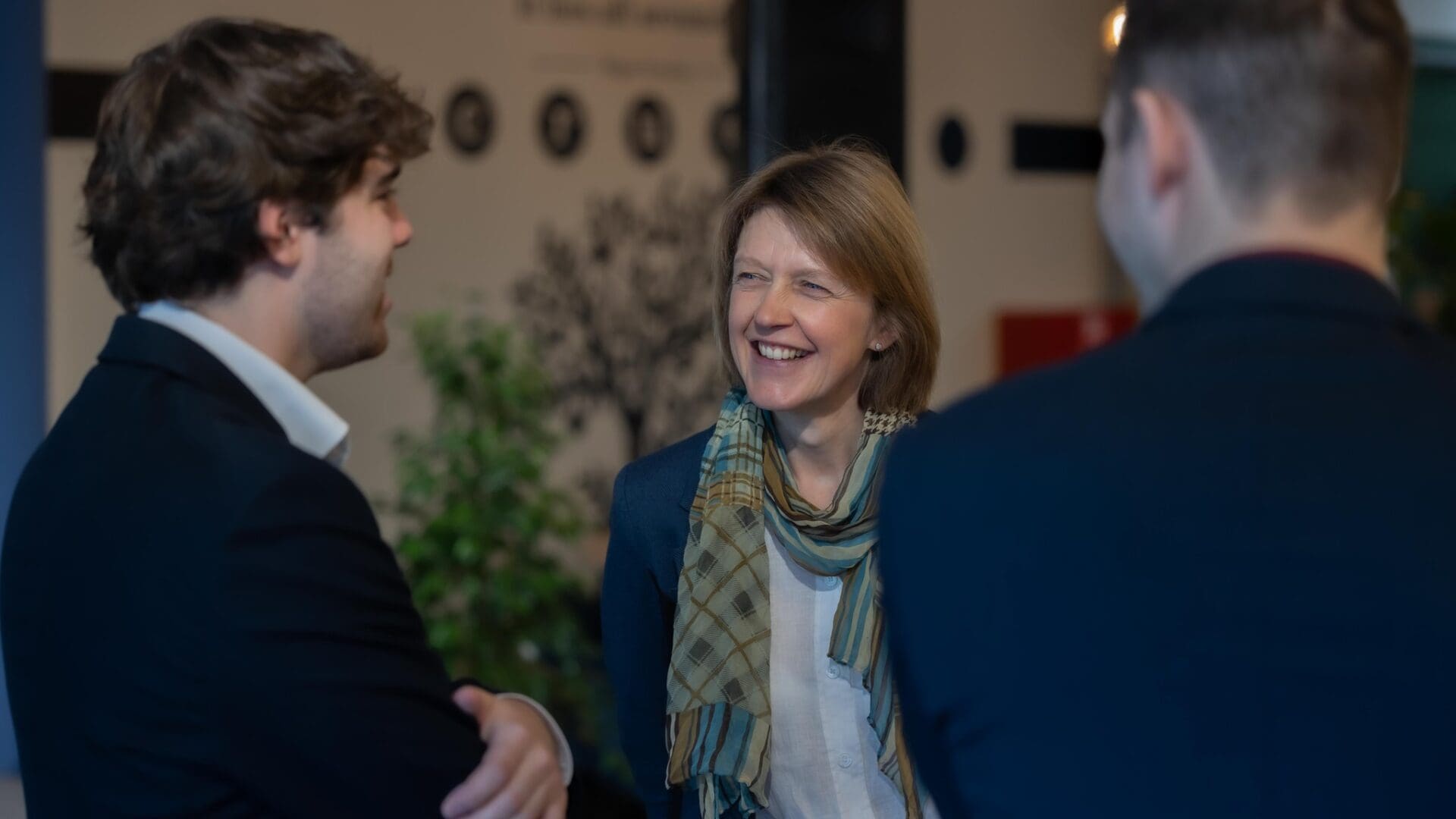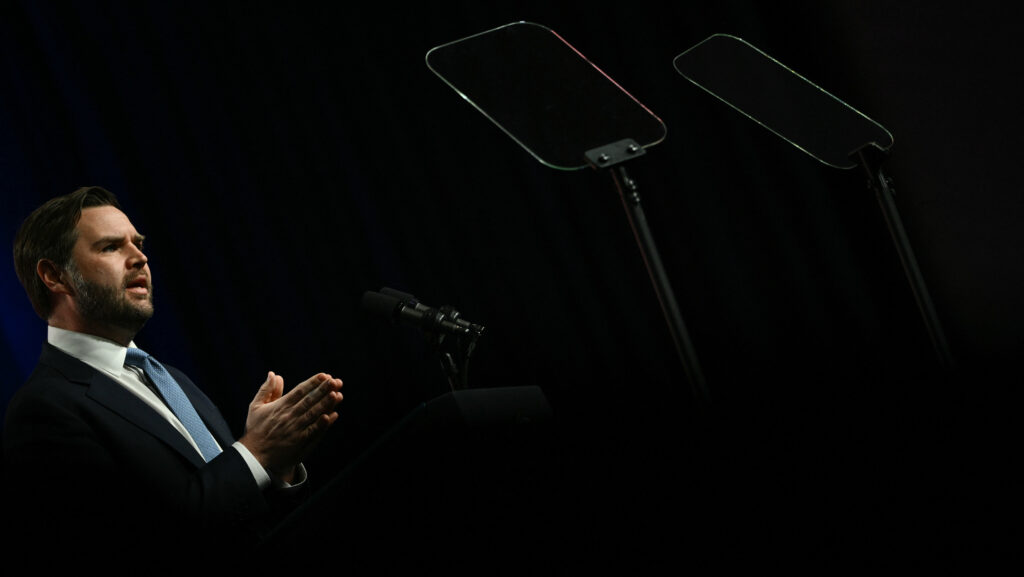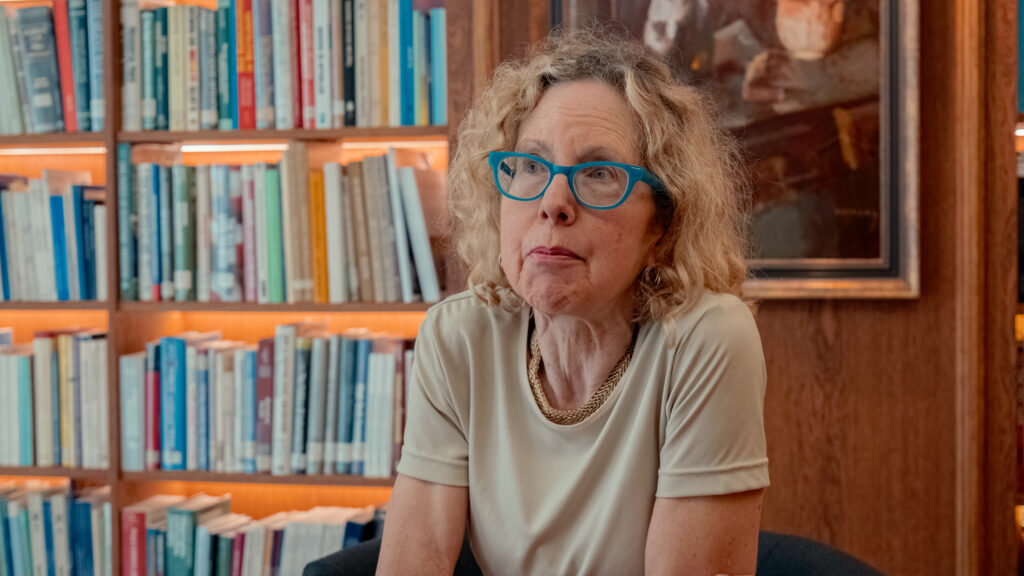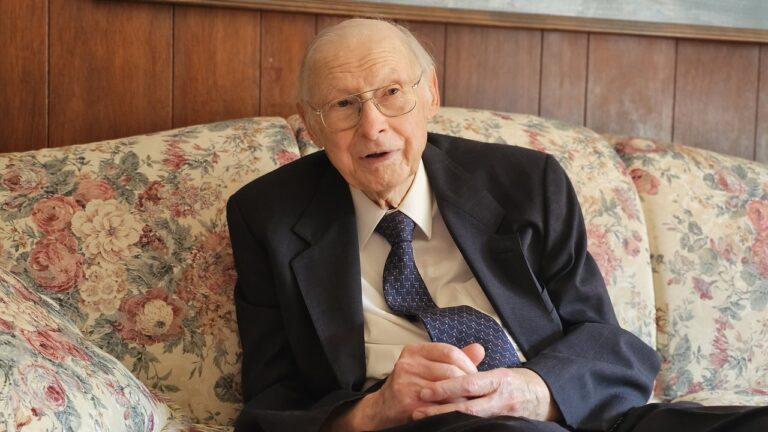Lady Scruton is not unknown in Hungary. She was here recently to to see for herself what impact his husband’s legacy left in Hungary, including the popular chain of cafés named after the great British conservative philosopher, Sir Roger Scruton. But Lady Sophie is not just the widow of Sir Roger—she was his number one co-worker on important projects. From 1999, the two worked together to establish Horsell’s Farm Enterprises. As the Roger Scruton Legacy Foundation puts it, while Sir Roger ‘gave lectures around the world building a network of followers, Lady Sophie built strong links with farmers, conservationists, and local historians. The small farms surrounding Sundey Hill Farm, the Scruton family home, were struggling in the business of turning grass into meat and milk. The solution, they felt, was to turn grass into ideas, and bring profit to the farm and the neighbourhood. Their project culminated in the Scrutopia Summer School programme where philosophy and friendship are cultivated.’
The interview below was conducted in Budapest on 17 April 2023.
***
You are an architectural historian, which could have been an opportunity for the two of you to meet…
At first, we only exchanged a few words, and indeed about architecture, but we met first riding to hounds in Badminton Park. We were talking on horseback. But Roger fell, horse and all. And I stopped, and went back to help. He thought it was very chivalrous from the first. He was charmed.
In his memoirs, Roger writes that he matured late. If my counting is right, his coming of age coincided with his meeting you? So, the rescue was a success in a metaphorical sense too?
That is very nice. He married me. It wasn’t our intellect; it was our temperament we shared. We travelled, went to concerts. But it was really the horses and the farm that brought us together. For Roger, who led a rather solitary life because of his job, it was a great joy, a fulfilment. Before we married, we corresponded, and once he quoted Jane Austen’s Pride and Prejudice: ‘It is a truth universally acknowledged, that a single man in possession of a farm and thirty acres, must be in want of a wife.’
Is that how he proposed?
No, that came later. Roger had an excellent sense of humour, and he made use of it all the time. At the age of 50, he decided to change his life, and move to the country. Before he did, he had discovered horses and fox hunting, and really wanted to commit to that. That’s when he found the house with its weathered walls, and loved turning it into a beautiful place. The previous owners had made many failed attempts at farming pigs or sheep. The dilapidated barns and sheds they left behind attested to that. He applied his sense of beauty to rebuilding it, using even the simplest materials. It was a way we could home-build together.
How did the farm become Scrutopia?
What Roger and I earned, we invested in the farm. The milk produced was not enough to build fences. In the end, however, we set it all up in a single business. Roger said we should show people that our product was ideas. Our neighbours could not turn meat and milk into profit. We are going to turn grass into ideas, instead of milk and meat. Many years later, when it all came together, a friend, the composer Robin Holloway, came to stay for the weekend, and as he walked through the gate, he exclaimed: ‘Ah, this is Scrutopia!’ So, he gave us the name. One of its branches is the summer university, where participants receive the highest-level training while collegiately exchanging ideas with their teachers in the idyllic surroundings of the farm. Today, mass universities cannot offer such intellectual gatherings, symposia in the original sense of the word, Scrutopia works to this day.
There are many little jokes about the farm that came from friends or our life with books. The area of our post box, for example, is called the ‘Trespassers W’ after Winnie the Pooh. In a philosopher’s family, we enjoyed word play…an ongoing ‘private language argument’. Roger was always switching letters at the beginning of words to create an amusing world for children and friends. The children called one of our ponds Dragon Pond, and we called the other one Iris Pond, because when Iris Murdoch and John Bayley came to visit us, Iris took all her clothes off, and slid into the muddy pond for a wild swim, but enjoyed it very well.
Roger would not have television in the house. Did he teach the children? Ancient Greek, like John S. Mill was taught by his father?
When Sam was born, Roger wrote an article about how he was not going to spare his child, that he would teach him Latin and Greek by the age of five, make him read Kant and all. But it was a joke. He wasn’t going to give his children a strict upbringing. We sent the children to a normal school to be together with other children. A private school. We hoped its curriculum would have classical literature and use traditional learning methods. I think the children learned the most from Roger in the way he talked to them. We often had friends for dinner, and, around the table, we would talk about serious things, books. This gave the children an understanding of why conversation is important, what is important in it. Roger encouraged them to speak fluently, without saying ‘like’, but he didn’t teach them. He didn’t have time for it, and neither did I. The children made friends at school and had some great teachers.
Roger turned towards religion later in life. How did this reflect in your relationship? Did he practice his religion in a visible way?
No. We are Anglicans. The Anglican Church is part of rural life. The church is usually the most beautiful building in any village. It’s a focal point. We like the building to be alive, not just a monument. So going to church is the appreciation of the beauty of rural England. The liturgy, the service, the music are also a source of beauty and inspiration. That was the level we went to church. How common prayer affects you, only you know. Roger believed that worship was important, that religion gave structure to life. He drew much comfort from Bible stories, especially the New Testament. He considered the New Testament idea of gratitude and forgiveness to be fundamental. I am sure his private prayers were in these terms.
So, he practised his religion in his inner solitude, not according to the Protestant ideal of a family living around the Bible. Did you say grace?
At Sunday lunch, when my mother was there with us. And we adapted to our guests. When the children were little, we used to say it more often. Most of the time we just said ‘Please begin’. Religious practice in the home is stronger in America. We had a chance to get a taste of that there. But that tradition is not strong in England, and we were no different from other households in this respect.
What did Roger think about religious education?
I think he thought that religious education should be given the same emphasis as maths, history or music. We did not want to give the children a specifically religious education. We tried bringing up the children according to the basic religious concept of right and wrong, and they took that on board. But that come from our upbringing as well. Because it is not just our idea of right and wrong, it is also our religious and cultural heritage. We let the children develop freely in a broad framework. There were no hard and fast rules about how one should behave. When I once was worried about something in their lives, Roger said, ‘I don’t think you should worry too much, they are bound to be “screwed-up”, just make sure they are screwed up in an interesting way!’ Both children respected us and how we wanted to live. We travelled a lot, left them with friends and family. They knew that this was Roger being Roger, and me going with him. Family life revolved around Roger or Roger and me, not the children. They had to hope for some attention, a sphere of influence, but we had set our lives up for ourselves. They were allowed to join in, but on our terms. They weren’t allowed to turn on pop music if their father was working. Not that they were forbidden, but it never crossed their minds. Their individual interests wouldn’t upset our lives.
How did you tackle the drink problem and especially then issue of drugs with the children?
It is hardly possible to win a fight with the temptations. The best you can hope for is that the children have the courage to resist. We talked about it, rather than tell them “the” truth, not to lecture them. Roger was very fearful of the long-term psychological effect of cannabis, schizophrenia. We talked about this on several occasions and the children are afraid of mental illness. I think that helped Sam and Lucy resist it. Of course, living in the country helps too. We also didn’t want to make too high demands of the children because any failure could make their lives miserable. Roger would have liked them to be musicians, but we didn’t push for it. I was called into school one day by Lucy’s headmistress and she said, ‘Your daughter will be very good at something. You don’t know what it is, I don’t know what it is. But we’ll find out. And she’s will enjoy it and do well.’ Lucy went for cross-country running. It was not something we planned for. She loved it, and had a tremendous time. A house full of books helps a lot. During lockdown, Sam began reading Tolstoy and Solzhenitsyn, showing off to his friends he has read War and Peace. But it was also important that we talked about the children’s friends, and we grieved together when they were tempted to drugs, or had mental difficulties. Roger had a lot of wise things to say about these tragedies they found support in.
How did Roger’s strong political views affect his family and his environment? How did he himself experience it when politics turned into personal conflict?
Political controversy was very hard on him. We worried for him, and tried to look after him. He took the attacks personally, and we tried to cheer him up, to love him. Sometimes, of course, I wondered why he had to get into a controversy that caused pain for himself and others, and maybe disagreement between us. I spoke about this with his sister. Roger knew what he was talking about and why he was defending his position. He had a sense of duty, and a gift to speak up. A lot of people encouraged him. When something was important for him, it pained him all the more. In 2018, the government invited him to join the Building Better, Building Beautiful Commission. It was a matter important to him. He was delighted to be able to turn his ideas into practice, policy, in a responsible office. He was very enthusiastic about the task. But immediately there was a massive attack by the press. It hurt him very much. He was writing a report on the government’s aesthetic requirements for architecture, which needed him to consult professionals in the architectural field, commercial people, and other stakeholders. There were sharp differences of opinion. We saw him working too hard and being too strained. When he complained, I, we, told him, ‘Please resign, you don’t need to do this.’ He didn’t want to hear of it, to shirk his public duty. He got ill from all the work. And then came the horrible, unprincipled attack from the New Statesman.
From the left-wing newspaper, to which he regularly contributed.
The journalist interviewed him and posted a fake transcript of the interview on Twitter, deeming him to be a racist and what not. A huge scandal ensued. Under pressure, the government immediately sacked him. It was a knee-jerk reaction, very wrong. Later, of course, when they learned the facts, to our great satisfaction, they apologised, and Roger retuned to the Commission. And he finished the report. What is more, the Ministers for Construction, James Brokenshire, Robert Jenrick and now Michael Gove, have continued to implement Roger’s recommendations. This is encouraging. Everyone was damaged, but everyone tried to put it right.
Most of Roger’s work is about human relationships, a celebration of the exchange of ideas. What did this mean in your everyday life? Did he get up from his desk and say, ‘Here’s this great idea, let’s discuss’?
Roger wrote a lot about how a meaningful life is in which you value the person you are speaking to. I think he carried that out well. He needed a home where he was free to work as much as he wanted, from 8 a.m. to 8 p.m. He did odd jobs around the house, he liked to cook. We had to let him be like that. He also let me form my own associations. But sometimes he would take it into his head that I should organise something quickly for the public good. That was all right, too, since they were a good cause, but afterwards it was good to have the help of the secretary, whom I wanted to have. The interpersonal support we gave each other was important, but family and friends were also involved. I was not able to get involved in all aspects of the intellectual life of Roger, but philosophers and musicians came with whom we had wonderful times together. But we probably got on well together because I’m not a philosopher. We discussed a lot of things; I don’t know how much I was useful to him, but he was very nice; if I said I didn’t like something in one of his writings, he would change it without a word. I read most of his manuscripts and he was always eager to hear what I had to say about them. He sent it to friends after me.
It’s hard to think whether I gave him the help he needed, and whether I gave it well. After his death, there were all the lovely letters from friends. And I felt guilty that I had not given him the support he had needed, that I had not taken him seriously, that I had not wanted to listen to his opinion on this or that. I didn’t always give enough love. I could not always keep up, and it might have seemed I didn’t want to. But I wanted to. It would have been difficult to be able to. When I talk to people I know, I feel guilty for talking of a perfection when there wasn’t, when I could have done so much better. I could have made his life so much better. We had similar temperaments, we liked being together, living in the same space. We did a lot of things together. We lived together for twenty-three years. It was a short time, but it was a great to have had. Strange to say, but during his illness I felt I could help him one hundred percent. It was almost a blessing to be able to take care of him. It was a gift for me now when I struggle with the guilt, I know that during his illness I gave him everything. In marriage, a thousand things can distract you from the other. During illness, nothing. Love grew stronger between us. It was nice to have it.
Related articles:








